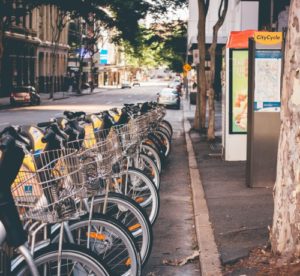 Cycling your commute is a great way to increase your physical activity while contributing to sustainability. Across the US, bike shares are making it possible for thousands of people to make these benefits a part of their daily routine.
Cycling your commute is a great way to increase your physical activity while contributing to sustainability. Across the US, bike shares are making it possible for thousands of people to make these benefits a part of their daily routine.
Bike Share To Increase Your Physical Activity
Bike share programs make it easier to add cycling to your life because you do not have to deal with owning, storing, or parking the bike. With the logistics reduced, it is easier to make short commutes to work, school, the grocery store, or a friend’s place which can add up to a lot of physical activity. In New York, for example, Citi Bike regularly records over 40,000 rides a day.1
Bike Share To Reduce Pollution
A bike ride is emissions free. The UN states in its Sustainable Development Knowledge Platform that transportation accounts for 25% of energy related greenhouse gases and therefore, sustainable transport must be a part of a sustainable future. When you choose the bike over car trips you promote sustainable transport, all while getting a little extra exercise.2
Bike Share To Connect To Communities
Cycling adds even more to a transportation system beyond emissions reduction. It brings less accessible neighborhoods into the larger network by offering a quick, affordable, and easy option for getting from public transportation stations to final destinations. This new ability to move freely into harder to reach places opens up new possibilities for residents and visitors alike, and cities are taking notice.3
The End Effect
Your personal health can benefit from making cycling a part of your commute and at the same time, you will positively impact sustainability and community building. Bike shares can help make it happen.
Related
Red Lantern Bicycles – Bikes, Coffee, Community
Interview With Bike New York – Cycling For Health And Social Change
